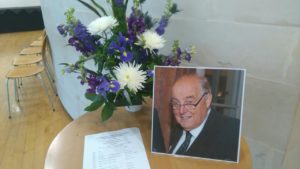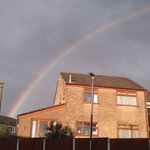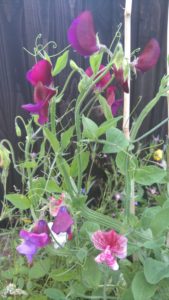
Opening prayer
Gathering God,
Gather us in, embrace us all
Bring us together
To remember and celebrate
A life lived and a life loved.
Guiding God,
Guide us onwards,
That together we may forge new directions
In love and service.
Generous God
Equip us all
By your Holy Spirit
That the Gifts we have by your Grace
be released to bring new life and hope here and everywhere.
Prayers of intercession
We pray for the courage and imagination to pursue complex research projects, the empathy and understanding to support the children and families who use our services, the openness and respect to encourage our colleagues in the days ahead and for increased awareness among ordinary people of these needs of children with epilepsy and their families.
In your mercy, hear our prayer
Bible reading: Mark 9:14-29
Sermon: At the bottom of the mountain
I first met Brian Neville in a lift in Guys hospital in 1984. He said ‘I hear you are interested in language and the brain’ and I replied ‘I’m interested in much more than that’. One of the things I was interested in was a collection of texts about 2000 years old about the life and ministry, death and resurrection of one Jesus of Nazareth, a portion of which we heard read.
Here are some of my sermon notes about that text:
1. A 2000 year old text, epilepsy is an ancient condition, a word from the Greek, meaning ‘seized with surprise’, and some see the origins of stigma associated with epilepsy today to be found in these ancient sources.
People with disabilities have found marginalisation and discrimination in texts like these, texts the church has often used to preach restrictive and confining theologies and impose views of faith and healing, rather than liberating theologies based on the lived experiences of disabled people.
So can such texts be redeemed? Let’s see shall we.
2. Doing RB (remembering the Bible), interpreting with those on the margins, children and those with communication difficulties. Another way of interpreting that is contextual. Can children interpret the Bible? They do it everyday. Some Stories of interpretation
A young man with cerebral palsy told me how he imagined it would have been to be a disabled person in the crowd on Palm Sunday ;
A teenager with dyslexia summarised the Easter story in three words: Jesus is back;
A 7 year old carrying the processional cross in a strong wind, declares carrying the Cross makes your arms hurt.
For every story of inclusion there are others of exclusion:
The parents of a child with LKS wanted to take him to church but found they were not welcome when he made sounds others couldn’t interpret;
A young man with a communication aid was told not to play with his toy in the service
A boy with autism climbed over the members of the congregation who impeded his path to the front of the church: what about developing a climbing wall in the church for him and the community? Too many unused vertical spaces. Too many closed in holy huddles that need opening outwards.
A boy, aged 16, says my favourite part of the gospel is…..
So pause for a moment and think, what is your favourite part of the gospel? That’s your remembered Bible.
His favourite part of the gospel: when Jesus was baptised by John and he got the Holy Spirit and God said ‘this is my son, I am well pleased with him’
3. Our interpretations today take us to the heart of the life of this family. I don’t just read this text, I live it. So do you, you know this child and this family even if, in the words of one boy with epilepsy, ‘He Don’t Talk’.
In some encounters not talking is a problem:How to proceed? How we started in the old Newcomen Centre, or the shed as we called it, with bubbles and bowls of water and progressed to the Wolfson centre, just another shed, and the Aristocats video via the patella hammer and ophthalmoscope.
Some professionals would say:
‘You just tell them what they want to hear’, which used to puzzle me.
The aim of any encounter is to listen so that understanding develops.
The cry of the father in the story was ‘I believe, help my unbelief’: a cry not just for help but for partnership. So what is faith like in the second decade of the 21st century? Certainly not uniform or one dimensional.
4. Some ask me: Did Brian speak of faith? My answer is Yes and No.
For example, he asked me about my understanding of Communion: ‘Isn’t it just sharing bread, feeding people?’ His was a down to earth faith.
But also No, he just got on with it, because that was faith to him. Don’t need to talk about it, do it, wear it like a coat everyday, not to hide behind but so that it wears thin at the elbows, becomes a series of patches.
5. The Faith we live by everyday, it’s full of questions, doubt, uncertainty as much as anything else. Prayer, also mentioned in the text, is a breathing space that gives faith time to activate, like yeast. So what about prayer? Did we pray? I never stopped doing it everyday, bringing time and space for reflection and silence onto the clinic room.
But I’ve stood beside him in the chapel at Guys and GOSH, in both formal and informal worship, and we’ve sat in silence together, like the morning after my daughter Hannah when a toddler was admitted to GOSH with a spinal abcess. Prayer is not a placebo, but a piece of genuine work, of holding and listening.
6. Living life at the bottom of the mountain, is also the turn in the route that takes Jesus downhill to Jerusalem.
Understanding epilepsy is like being at the bottom of a mountain.
But we are not alone there.
After his mountain top experience, with Moses and Elijah, the two greats of the Hebrew Scriptures, Jesus came back to the bottom of the mountain, to the everyday lives of ordinary people like this child with epilepsy and his family.
Depends which voices we listen to, what we hear. Whatever our clinical or research work or theology it must amplify the voices of those silenced by their condition, or service limitations, or discrimination they encounter.
When others were speaking of Brian’s hopeful outlook this morning, to me that was the living Gospel in him.
How did this child and his family remember and retell the story afterwards? That brings me to making the Bible up, with which I’m sometimes charged and which I often do.
(there’s an example in Word of Mouth page 109).
And to Brian I would say, ‘It’s like Communion, real bread, living on scraps, enough to feed everyone’.
Jesus went onto Jerusalem, you know the rest of the story: passion, suffering and new life. And the family, what happened to them? You meet them everyday. Listen then if you have ears.
In the chapel at GOSH, there’s a sculpture shaped like an eye, in the centre of which there’s a small family. This image inspired the words of this blessing.
Blessing
In God’s eye, today and everyday;
In Christ’s footsteps, today and everyday;
Blessed by the Holy Spirit, now and forever;
In the name of God, Father, Son and Holy Spirit, Amen.
These words were from the service to celebrate the life and work of Professor Brian Neville held on 3rd May 2017 at St George’s Church, Queen’s Square. They are notes only, not a complete script but hopefully make sufficient sense.


